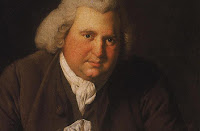What's so amazing is Miéville's language. Look at this, the opening paragraph of the book:
The children of the embassy all saw the boat land. Their teachers and shiftparents had had them painting it for days. One wall of the room had been given over to their ideas. It's been centuries since any voidcraft vented fire, as they imagined this one doing, but it's a tradition to represent them with such trails. When I was young, I painted ships in the same way.Anyone understand this? Anyone know exactly where we are, what's going on? How many words we've never seen before? Enough to signal we're in a new territory, literally and linguistically.
Perhaps this is familiar from science fiction novels, I don't know. I'm reading more and more work that is labelled "science fiction" but Miéville prefers to call his writing "new weird" and that sounds about right to me. Anyway, there are those readers who will no doubt be put off by this opening, or if not then by all the continuing novelty that swiftly follows. This is an introduction that is almost an anti-introduction. It almost says: "You will not understand me, but if you persevere it will be worth it". And it is.
Suffice it to say, Embassytown is an immensely complex novel which employs Miéville's new and highly inventive language and concepts to illustrate fundamentals about how we communicate, the need to be able to lie, and about love, friendship, community, safety, war and power. He doesn't provide definitions of his many, many new words, and that's what captivated me - I had to work hard, I couldn't skim anything, just to keep my footing, or at least one foot on the ground! And I loved that.
Now here's an interesting thing: I found the final 100 pages less compelling. Yes, it was a happy-ish ending, yes it tied up lots of loose ends. But I think it was more than that, I believe it was because I finally understood all the new words, got to grips with the novel concepts, which species was which, who did what. The mystery? Gone.
This made me think, of course, about my own writing. And also about the stories i am reading as part of the sifting I am doing for a short story competition. How often do you read a story that keeps you working hard? How much more compelling is it if the story doesn't give itself away too soon? However, the majority of the stories I've read for competitions not only give it away, they then add far too much information. Background, backstory... descriptions, explanations... All of which, for this reader at least, serve to push me away from the story. I think, Well, why should I keep reading? What's there left to find out? What's the mystery?
I do try and apply this to my own work, although it's harder to know how a reader who is not me will read it, since I am all-knowing (well mostly) about my own story. I tend to err on the side of too mysterious, too cryptic and minimalist, I think. But I think that it's better to err on that side, have your reader a little confused and curious than pile on information and lose their interest completely.
What helps (and here's a clumsy segue into the other thing I wanted to mention!) is having a trusted reader or group of readers read your work, not something I do that often anymore. "Trusted" is not easy to come by, and as Robin Black talks about in her excellent blog post over at Beyond the Margins, sharing work can lead to horrible experiences. She suggests that reading and commenting on a writing colleague's work should be "a process of honoring the fact that the piece exists at all, as opposed to shredding or praising it." I like this very very much, she gives eminently sensible advice and airs issues that are not often talked about public. Check out the blog post, On Reading One Another's Work.
I also highly recommend China Miéville's writings. I loved his short story collection, Looking for Jake (published in 2005 and reviewed on The Short Review here), which is weird but very different from Embassytown, and am going to seek out more of his books. I hear him speak recently at the One Culture science and literature festival held in the Royal Society in London and was extremely impressed by the way he talks about writing, about stories, about genre pigeon-holing. You can read a blog report of that event on the Royal Society's blog.
And perhaps, as 2011 draws to a close and 2012 approaches, next year will be a year of opening ourselves up to the mysterious in our writing? Of giving the reader some space to figure things out for him or herself? And of celebrating that in our colleagues' work too, if they share it with us. A giving-in to the not-knowing, perhaps. Because, really, what do we actually know? Happy holidays, everyone.
























